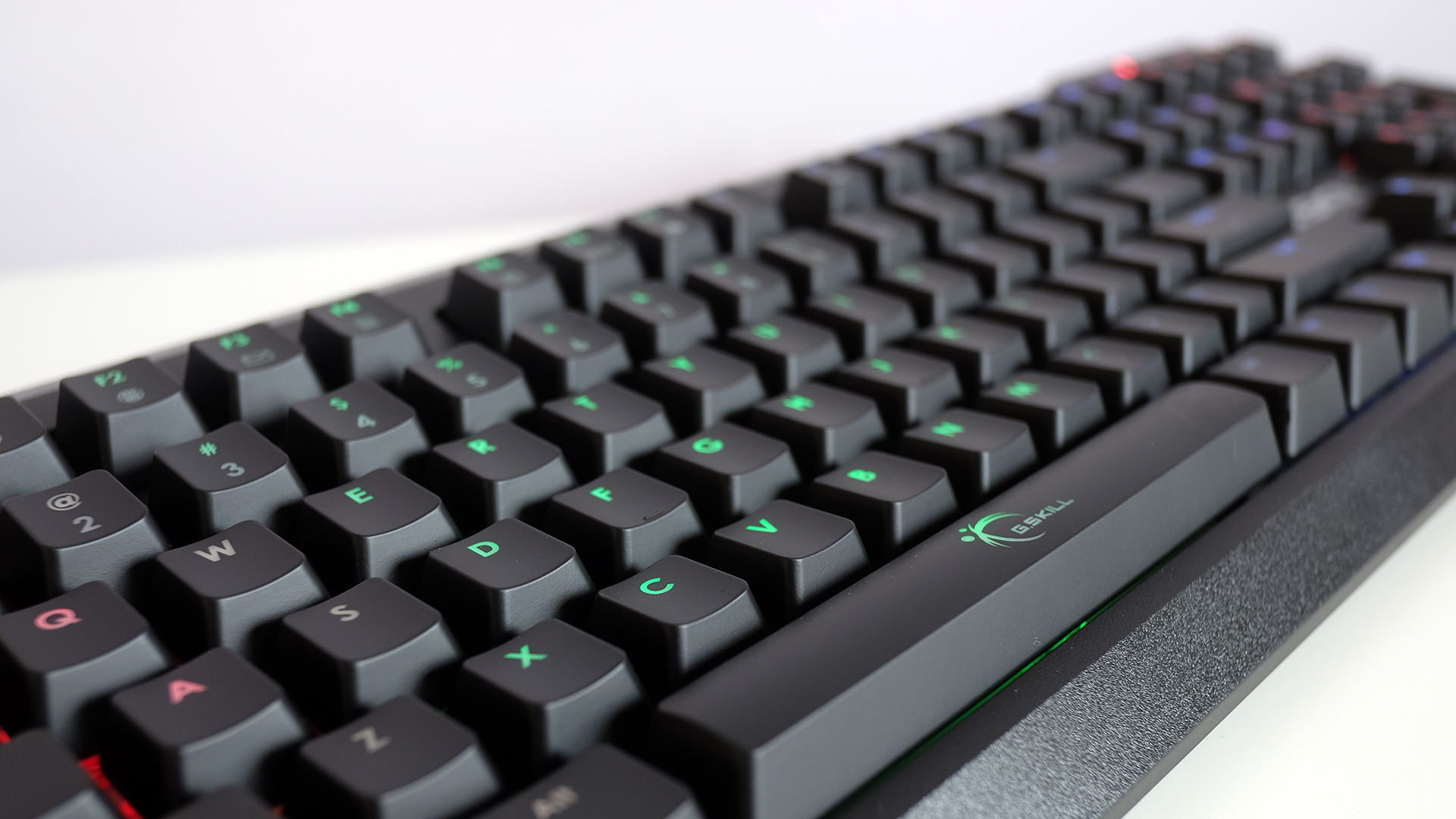TechRadar Verdict
This is a solid and reliable mechanical keyboard that doesn’t take up any more space than it needs to. A lack of USB ports may put some of you off, though.
Pros
- +
Bright, customisable RGB backlight
- +
High-quality Cherry MX switches
- +
Stiff, solid construction
Cons
- -
No USBs
Why you can trust TechRadar
The G.Skill Ripjaws KM570 is a sensibly priced mechanical keyboard. It’s around half the price of some of the other big names.
It still has great features like a full multi-colour backlight, anti-ghosting and real Cherry MX switches, though. And, crucial for some, it’s no bigger than a conventional keyboard. What’s not to like?

Design
Take off the G.Skill Ripjaws KM570’s logos, strip it of its rainbow backlight, and it would look much like a conventional keyboard. There’s no “edgy” font on its keys, no big palm rest and no obvious row of macro buttons.
If you want a full-speed-ahead gaming keyboard with a look as aggressive as a gaming laptop, that may sound like a negative observation. But it isn’t necessarily.
Have a small desk or a lap-gaming sofa setup? The G.Skill Ripjaws KM570 could well be the perfect size.
There’s little sense this is a cheap keyboard in its build too. We’ve prodded every square inch of this keyboard, and none of its surface flexes even under fairly significant finger pressure.

As you’d probably guess, the G.Skill Ripjaws KM570’s shell is all plastic. It’s standard textured black plastic: no shiny bits. However, inside there’s a plate of steel that helps maximise its rigidity.
It is quite low on obvious features, however. The G.Skill Ripjaws KM570 does not have any USB ports, or any strips of dedicated macro buttons.
A couple of other bits that might be of interest to some include its weight, which at 1.25kg is fairly standard, and that it takes up two USB ports, not one. Just one cable, a thick braided wire, comes out of the G.Skill Ripjaws KM570, but at the final 40cm there’s a Y-shaped terminal that splits off into two cables.
One for the basics, one for the LED backlight power. However it seems to work fine plugged into a single USB if it can draw enough power. The cable is non-removable, but in our experience this actually avoids potential issues with the USB connector on the back going wonky after a while.

Backlight and Software
Its use of backlighting is quite interesting. Look straight down at the G.Skill Ripjaws KM570 keyboard and you’ll see quite significant space between the keys, showing the LED diffuser panel underneath. The keys appear to sit on a bed of light, rather than it just filtering up through the key lettering.
It’s quite a neat look, particularly if you want to embrace a bit of color. Initially the G.Skill Ripjaws KM570 displays a rolling rainbow of LED color, but using the keyboard’s software you can customise it.
The color can be set per-key. You can just turn a few keys’ lights if you like.
There are also eight animated backlight profiles, although we imagine most gamers won’t want to use these unless they’re showing off.

Typing and Noise
While the G.Skill Ripjaws KM570 does not have a bank of separate macro buttons, there are a good number of little features baked into the keyboard. Along the function keys you have media playback controls, app shortcuts and volume controls. And there are screen brightness controls, secondary functions of the arrow keys, which will be handy if you use the keyboard with a laptop.
Using the Windows driver software, you can also set a macro or text function to any key. You specify the text or macro keypresses, then set it to the key of your choice. And a CTRL+key press will set it off.
The feel and sound of the G.Skill Ripjaws KM570 keyboard is largely defined by its use of Cherry MX Brown switches. Keyboard obsessives can argue all day about which 'color' of Cherry mechanical switch is the best, but Brown offers a solid middle-ground option most should be able to get on with.
The feel and sound of the G-Skill Ripjaws KM570 keyboard is largely defined by its use of Cherry MX Brown switches. Keyboard obsessives can argue all day about which 'color' of Cherry mechanical switch is the best, but Brown offers a solid middle-ground option most should be able to get on with.
This is one of Cherry’s quieter switches. It’s still a lot louder than your average membrane keyboard or the custom switches SteelSeries makes, but is relatively easy to bed into.

Similarly, key presses require only moderate force: 45g of pressure is the official stat. The Cherry MX is a tactile switch, which means there’s a bump of resistance at the point where the switch is actually engaged. Your other options among mechanical keyboards are a click feel or a linear switch, where the pressure is constant through the depress.
Most of us are so accustomed to a degree of tactile feedback in our keys, “tactile” is the obvious place to start. Linear feedback is often favored by gamers really willing to get to know their keyboard, but there’s no obvious “tell” when you’ve pressed the key enough to spark the command.
The part G.Skill adds other than the choice of Cherry switch is the key contouring. The Ripjaws KM570 has full height keys with quite distinctive contouring of their top surface. They are smoothy bowed in the centre, cupping your fingertips.
It takes a little getting used to, but within 30 minutes we were typing away at full speed.

Verdict
The G.Skill Ripjaws KM570 is a high-quality, reasonably priced mechanical keyboard that should appeal if you want something that isn’t too big or ostentatious.
Switch off the backlight and it can pass for an ordinary productivity keyboard. Turn it on and you can make a light show worthy of an esports team. The main reason for pause is there are no USB ports, which may put you off if you want a wired setup for the lounge that’ll let you plug-in a mouse.
Andrew is a freelance journalist and has been writing and editing for some of the UK's top tech and lifestyle publications including TrustedReviews, Stuff, T3, TechRadar, Lifehacker and others.

